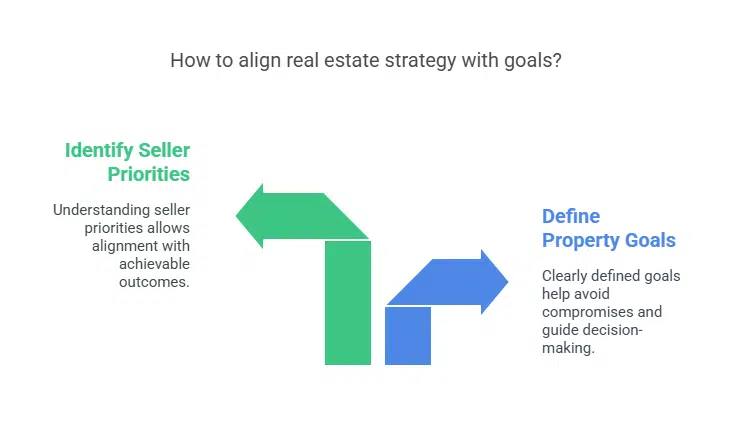Real estate deals can feel tricky—especially when you’re unsure what steps matter most during negotiations! Whether buying your dream home or selling at top dollar—one wrong move could cost you thousands!
But here’s something you should know…mastering essential elements like effective communication, prioritized goals, & creative solutions ensures smooth deals every time!
This guide breaks down essential elements step-by-step…helping buyers/sellers navigate challenges like comparison shopping, seller priorities, & risk-free financial arrangements.
Ready? Let’s turn stressful talks into winning results!
Analyzing Real Estate Market Dynamics
Local market trends shape property values—understanding them gives you an edge during negotiations. Comparing similar properties helps you gauge fair pricing before making any offers.
Comparing similar properties
Analyzing comparable properties ensures accurate pricing and better negotiation outcomes.
| Metric | Importance |
|---|---|
| Recent Sales Data | Provides insights into current market value and trends. |
| Days on Market (DOM) | Indicates demand levels and property appeal. |
| Property Condition | Affects valuation and buyer interest. |
| Price-to-Rent Ratio | Helps assess rental income potential vs. purchase price. |
| Capitalization Rate (CAP Rate) | Evaluates investment return on income-generating properties. |
| Cash-on-Cash Return | Measures profitability relative to cash invested. |
Setting Goals and Priorities in Real Estate Deals
Define your property goals clearly to avoid unnecessary compromises. Focus on identifying seller priorities to align your strategy with achievable outcomes.
Establishing achievable outcomes
Setting clear goals defines what you want from each real-estate deal—be it price range purchase-price closing-date seller-priorities financing-terms home-inspection repairs credit risks etcetera. always aim practical given current property- values, comparables across San Mateo County Daly City alike ensures informed choices made beforehand rather than regrets after signing lease-agreements legally binding papers plus having contingency plans ready keeps surprises minimal during entire process. Knowing exactly which aspects are negotiable versus fixed upfront avoids wasted time energy resources later down line especially financial clauses involved therein too… Stay focused!
Enhancing Negotiations through Effective Communication
Active listening builds trust and uncovers key details in real estate talks. Clear, positive communication fosters strong relationships with buyers, sellers, and agents.
Practicing active listening techniques
Practicing effective communication begins by improving your ability to listen attentively during real estate negotiations—it builds stronger relationships between you and other parties involved, such as sellers, buyers, tenants, or lending institutions, helping establish mutual respect swiftly while uncovering unspoken needs and desires effectively—even in high-pressure scenarios! Focus closely without interruption; restate what’s been communicated before responding thoughtfully—this demonstrates understanding and helps clarify potential misinterpretations promptly, reducing errors later and saving time, money, and effort for everyone involved, ultimately increasing the likelihood of reaching favorable agreements efficiently together rather than prolonging the process unnecessarily due to the lack of proper dialogue exchange established correctly from the outset.
This approach fosters smoother transitions, leading to successful, amicable outcomes where all parties find satisfaction and mutual agreement with a sense of peace, joy, and fulfillment.
Cultivating positive interactions with stakeholders
Building connections through attentive listening establishes trust—a key element essential during real-estate negotiations—and enhances communication efforts, leading directly to successful outcomes in dealings involving participants such as buyers, sellers, and their respective representatives.
Open conversations create mutual understanding around important details within buyer-seller discussions on matters ranging from purchase prices to closing dates. Thoughtful consideration of individual seller priorities ensures that everyone involved feels valued and respected, fostering constructive progress beyond initial offers and achieving positive, inclusive, and mutually beneficial results.
Encouraging Creative Solutions in Property Negotiations
Consider unconventional approaches to discover mutually beneficial outcomes in real estate transactions. Flexibility in terms and creative compromises can seal agreements faster.
Seeking mutually beneficial outcomes
Focusing on win-win solutions builds stronger real estate deals. Prioritize solutions that benefit both buyer and seller. This approach fosters trust and encourages open communication.
Clear objectives help maintain focus on shared goals, making negotiations smoother. Creative problem-solving often leads to better agreements—adapt terms to fit both parties’ needs, like adjusting the closing date or financing terms.
Understanding the market dynamics boosts your ability to find common ground. By exploring options together, you increase the chance of a successful transaction that satisfies everyone involved.
Adapting negotiation terms creatively
Creative adaptation enhances real estate negotiations—flexible closing dates benefit both buyers needing time sellers wanting swift sales Repair agreements offer middle ground reducing disputes over inspection findings Non-monetary incentives like including furniture boost appeal without raising purchase price Crafty adjustments address financial constraints—alternative financing eases buyer burdens seller accepts Installment payments build rapport Trust grows Effective communication fosters trust Innovative solutions bridge gaps
Strategizing Concessions for Better Negotiation Leverage
Smart concessions can strengthen your position during real-estate talks—know when to give ground wisely without losing sight… Offering small trade-offs early builds trust yet keeps crucial deal points secure….
Utilizing concessions strategically
Strategic breaks can effectively move deals forward—if used wisely during real-estate negotiations. Thoughtful planning allows for smoother outcomes without rushing into poorly considered decisions.
Carefully consider each step before making concessions prematurely. Offering smaller items can foster goodwill between parties, especially regarding significant issues like purchase prices, financing arrangements, closing costs, and more.
Always evaluate the impacts against the set objectives established earlier in discussions, maintaining focus on the desired outcome. Flexibility often leads to better agreements, and success stories are abundant.
Industry professionals and the National Association of Realtors suggest similar methods that have been successfully implemented in many documented cases within both commercial and residential sectors.
Examples might include lease arrangements, contractual obligations, remedies, monetary damages, and financial considerations involving landlords, tenants, banks, taxes, and multiple listing services.
Keeping Composure in High-Stakes Negotiations
Stay calm under pressure—your composure builds trust during tense talks—and resist making quick choices influenced by emotions; focus instead on facts—they’ll guide you better than feelings ever could!
Remaining emotionally unbiased
High-stakes negotiations require maintaining emotional control—a consistent focus helps you remain alert during important moments like finalizing deals. Strategies such as taking brief breaks can help manage stress levels effectively.
Understand the motivations beyond the purchase price; sellers often have priorities closely tied to their needs. Building rapport promotes open discussions without unnecessary emotional conflicts.
Stay professional by setting personal feelings aside during conversations about initial offers and financing contingencies. Achieving mutually beneficial results strengthens relationships long after agreements are confidently signed.
Resisting impulsive decision-making
Real estate negotiations often stir high emotions, making it easy to act impulsively. Acting on emotions can lead to poor choices, like agreeing to unfavorable financing terms or overlooking critical inspections.
Skilled negotiators stay calm, focusing on strategy rather than emotional decisions. They weigh every offer and counteroffer carefully, ensuring each move aligns with their property goals.
Staying unbiased under pressure helps avoid costly mistakes. Effective decision-making demands patience and a clear plan, keeping impulsive reactions at bay.
Finalizing Real Estate Transactions Accurately
Review every term carefully before signing any real-estate-contract—details matter greatly here! Double-check financial figures like purchase-price & closing-costs; errors can cause delays during final steps!
Ensuring thorough review of all transaction terms
Double-check every detail in real estate contracts to avoid costly mistakes. Verify the purchase price, closing date, and financing terms align with your goals. Ensure all contingencies—like home inspection or financing clauses—are clearly stated.
Work closely with a real estate attorney to confirm terms meet legal standards.
Pay attention to seller priorities and any special conditions they’ve included. Scrutinize lease agreements or assignor details if applicable. Review closing costs and ensure no hidden fees are buried in the fine print.
A thorough review protects you from breaches and ensures a smooth transaction process.
Takeaways
Mastering real-estate negotiations requires skill—and preparation ensures success! Every deal depends on understanding your markets thoroughly and establishing clear benchmarks from the start—that’s the key to success!
Meet Dr. Sophia Reynolds. With over two decades of experience consulting investors globally, her Ph.D. studies offer solid insights—plus countless awards recognizing excellence across residential and commercial sectors alike.
She has an exceptional understanding of the field.
“Effective negotiators focus on analyzing property comparisons carefully,” says Dr. Reynolds, adding, “They rely on accurate data points consistently!” By properly comparing recent sales records with current listings available nearby, you gain a clearer perspective and stronger positioning.
She emphasizes ethics as well, stating, “Honesty is crucial during discussions, as transparency builds trust quickly.” Whether addressing contractual details carefully or disclosing issues openly upfront, integrity is the ultimate winner every single time.
FAQs on Essential Elements For Successful Real Estate Negotiations
1. What are key negotiation strategies when buying property?
Effective negotiation strategies involve understanding seller priorities—like closing dates or financing terms—and making an initial offer that aligns with comparable properties’ values.
2. Why should buyers avoid emotional decisions during negotiations?
Emotional decisions can lead buyers away from their property goals—such as purchase price limits or desired terms—and weaken their position during high-stakes transactions.
3. How does building rapport help real-estate negotiations?
Building rapport fosters trust between parties—whether it’s through effective communication or shared interests—making it easier to agree on closing costs or other critical details.
4. What role does financing play during real-estate deals?
Financing contingencies protect buyers by allowing them time secure financial aid before committing fully; this ensures smoother handling potential breaches-of-contract issues later down line too!







































